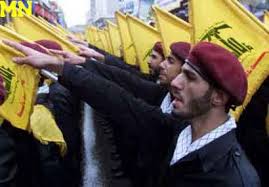
The British parliament has debated widening its ban on the Islamist Lebanese faction Hezbollah amid claims of flaws in the official assessment behind the group’s current designation.
The group’s military wing is currently prohibited in the UK, though its political wing remains free to operate – a differentiation that has caused controversy.
In 2001, the group’s external security organisation was proscribed, and the ruling was extended to Hezbollah’s entire military apparatus in March 2008. But almost 10 years later, many prominent politicians argue that the current proscription does not go far enough.
The current ban relies on a differentiation between Hezbollah’s political and military wings – in Lebanon the group have ministers in the government, as well as a standing militia of several thousand men. But proponents of the new ban claim this is a false distinction.
Introducing the motion, member of parliament Joan Ryan said “it is an artificial distinction”, and that it was “time to end this dangerous game of semantics”.
Writing this week, Dr Matthew Levitt, director of the counter-terrorism programme at The Washington Institute for Near East Policy, said: “The problem with the UK model is two-fold: first, it is based on a fiction which Hezbollah itself rejects; and second, this half-measure has not stopped Hezbollah from operating on British soil or undermining British interests abroad.”
He said “this a political distinction of convenience which Hezbollah’s own leaders reject. In 2000, Hezbollah deputy secretary general Naim Qassem explained that ‘Hezbollah’s secretary general is the head of the Shura Council and also the head of the Jihad Council, and this means that we have one leadership, with one administration’.
“Speaking in 2012, Qassem added: “We don’t have a military wing and a political one; we don’t have Hezbollah on one hand and the resistance party on the other … Every element of Hezbollah, from commanders to members as well as our various capabilities, are in the service of the resistance, and we have nothing but the resistance as a priority.’”
But not all are in agreement. UK government policy currently stands against raising the designation on the grounds that any such intervention could destabilise Lebanon, where the group has several MPs and ministers in the government.
Prior to Thursday’s debate, Labour MPs were advised to vote against a renewed designation of Hezbollah on the grounds it could damage efforts for peace in the Middle East. Indeed, the party’s leader and UK opposition leader Jeremy Corbyn has previously drawn criticism for a 2009 parliamentary meeting in which he referred to the group and Hamas as “friends”.
A Labour party briefing note claimed: “There is a balance between making absolutely clear our abhorrence of using violence to achieve political ends and at the same time encouraging organisations down an effective democratic path.
“Full proscription could be a move against dialogue and meaningful peace negotiations in the Middle East.”
It added: “Proscription could prevent the UK or other governments from engaging with the Lebanese government and could lead to a breakdown of diplomatic relations.”
But speaking in favour of the ban, Labour MP Ian Austin blasted his own party’s position. “The organisation has carried out terrorist attacks and racist murders in the Middle East, in Europe and across the world,” he said.
“[Hezbollah] is not interested in the compromises that all sides will need to make to bring about a two-state solution. Its sole interest is the destruction of Israel.
“The idea Hezbollah is a partner for peace is misguided”.
Colin Clarke, a research fellow at the RAND institute told The National that while Hezbollah may not be currently active in terror plots against western targets, it is their potential that should be of concern.
“[Hezbollah] are not actively attacking the West, but they are well positioned to do so, should things heat up between Iran and the US.
“They could be activated, with seeming ease, they have cells all over the world. It’s more the potential of what this group can do, as well as what they’ve done in the past
He added that “the British policy is lending legitimacy to this group, which I think is a major mistake”.
A poll carried out by ComRes indicated that 81 per cent of Britons were in favour of an increased terror designation of the group.
The group have come under renewed scrutiny since the onset of the civil war in Syria. Analysts claim that the group has thousands of its members fighting alongside the regime of Bashar Al Assad. Human rights organisations accuse the group of sectarian killings.
THE NATIONAL

Leave a Reply
You must be logged in to post a comment.